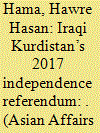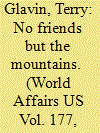|
|
|
Sort Order |
|
|
|
Items / Page
|
|
|
|
|
|
|
| Srl | Item |
| 1 |
ID:
166770


|
|
|
|
|
| Summary/Abstract |
In the early morning of 3 August 2014, Islamic State of Iraq and Syria (ISIS) attacked the Sinjar district in the vicinity of Mosul. The area was largely under the control of Kurdish forces at the time, especially those associated with the Kurdistan Democratic Party (KDP). Those forces could not defend the district and ISIS was able to take control of the area. Consequently, a considerable number of Yazidi people were killed or displaced, while female Yazidis were raped and kidnapped. This study, based on framing theory, attempts to explain how two major Kurdish media organizations, Rudaw, which is loyal to KDP, and the Kurdish News Network (KNN), which is loyal to the Gorran (Change) Movement, each covered the event in their news reports. By performing a content analysis of 222 news stories covering the event, the key finding of the research is that, in instances of assigning responsibility for the fall of Sinjar, political considerations are the determining factor in how the narrative was framed. Taken as part of a growing literature on media in Kurdistan, the research outlined in this article supports the conclusion that the framing of media coverage in the Kurdistan Region is subject to strong political bias and media organizations support the political narratives advanced by their political patrons, as it is the case in many other Middle Eastern countries.
|
|
|
|
|
|
|
|
|
|
|
|
|
|
|
|
| 2 |
ID:
171874


|
|
|
|
|
| Summary/Abstract |
On 7 June 2017, the former Kurdistan president Massoud Barzani called a meeting between 15 Kurdish political parties to seek their approval for a referendum on Iraqi Kurdish independence. Despite many adverse circumstances – the proroguing of the Kurdistan parliament, the strained relations among the Kurdish political parties, and the general political stalemate in Iraqi Kurdistan – the meeting agreed that a referendum should take place on 25 September 2017. However, both the Gorran Movement (Gorran) and the Kurdistan Islamic Group (Komal) refused to take part in the meeting and instead requested that the government's main focus be on restoring the political environment and restarting the Kurdistan parliament before any discussions take place on the issue of a Kurdish referendum. Notwithstanding internal, regional and international pressures, the Kurdistan Regional Government pressed ahead and held its referendum on 25 September 2017. The central question that remains about the Kurdistan referendum is what really motivated Kurdish politicians, in particular those of the Kurdistan Democratic Party (KDP) to hold the poll? This article argues that the KDP has a number of different public and private motivations in holding the independence referendum, which need to be explored.
|
|
|
|
|
|
|
|
|
|
|
|
|
|
|
|
| 3 |
ID:
167684


|
|
|
|
|
| Summary/Abstract |
Less than a month after the Kurdistan independence referendum, the Iraqi Army and units of the Popular Mobilisation Forces (PMF) attacked the disputed province of Kirkuk on October, 16, 2017. Unlike most national defence forces, the Kurdish Peshmerga is divided along partisan lines between the two largest parties in Iraqi Kurdistan. This particular area was largely under the control of units affiliated with the Patriotic Union of Kurdistan (PUK), which decided to make a strategic withdrawal in the face of superior numbers and firepower. The city was then retaken in short order by forces loyal to Baghdad, as were all other disputed territories previously under Kurdish control. Subsequently, the allegation that the PUK had retreated too easily has been described by the rival Kurdistan Democratic Party (KDP) and others as a betrayal of the Kurdish people by the PUK. This has created two competing post-event perspectives: first, that the Peshmerga forces should have defended Kirkuk to the last man and should not have left their front line trenches; second that the withdrawal of the Peshmerga was a deliberate and rational military reaction to overwhelming opposition. This article critically assesses both perspectives and finds that partisan divisions in the Peshmerga critically undermined the ability of Kurdish forces to defend the disputed areas that they controlled. Instead of serving as motivation of create a unified fighting force, the loss of Kirkuk has only served to deepen those divisions.
|
|
|
|
|
|
|
|
|
|
|
|
|
|
|
|
| 4 |
ID:
138569


|
|
|
|
|
| Summary/Abstract |
It is out of the Middle East’s current nightmare that the old dream of a united Kurdistan is drawing new breath. Kurdish independence, if not in whole then at least in some combination of its disconnected parts, may well be the one thing worth salvaging from the region’s killing fields. A firmer alignment on the part of the US with Kurdish interests would certainly salvage something from the shambles of American foreign policy in the Middle East, too.
|
|
|
|
|
|
|
|
|
|
|
|
|
|
|
|
|
|
|
|
|